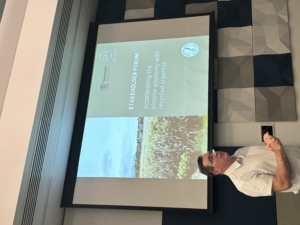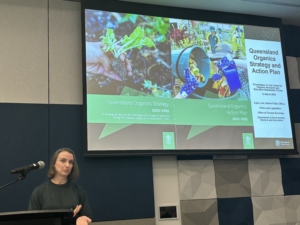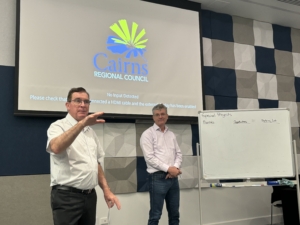Cairns stakeholder forum encourages greater uptake of recycled organics to protect Reef waterways
Industry stakeholders have moved to accelerate the uptake of recycled organic materials in the Far North Queensland region and protect the Great Barrier Reef at a Cairns forum organised by CORE.
The forum explored strategies aiming to accelerate the uptake of recycled organics among farmers, councils, local community, and the recycling industry in the Great Barrier Reef region. The March 13 event, hosted by Cairns Regional Council, followed two successful forums held in Townsville and Brisbane last year, where a number of key stakeholders from nearby regions attended.
The forum was held as part of CORE’s five-year partnership with the Queensland Department of Environment, Science and Innovation to help develop local markets for products made from recycled organic materials.
Speaking at the Cairns forum, the Department of Environment, Science and Innovation’s (DESI’s) Celia Luck stressed the importance of the “Queensland Organics Strategy and Action Plan,” aimed at improving management of organic materials along the organics supply and consumption chain.
Under the Strategy, the Queensland Government is targeting by 2050 a 25 per cent reduction in household waste and a 75 per cent recycling rate across all waste types, together with just 10 per cent of all wastes going to landfill.
“By 2030, the Queensland Organics Strategy aims to halve the amount of food waste generated, divert 80 per cent of organic material generated from landfill and achieve a minimum organics recycling rate of 70 per cent,” said Ms Luck, Senior Policy Officer, Policy and Legislation, Office of Circular Economy at DESI.
DESI has set objectives across 29 action items, with a focus on improving management of organics materials and working closely with Regional Waste Management Plans. The Department has partnered with education groups such as EcoMarines and Grow it Local and is supporting projects with organisations such as CORE, with a commercial food organics trial undertaken in Townsville.
CORE’s CEO, Chris Rochfort said the organisation was working with farmers to integrate recycled materials, reducing water, chemicals, energy and run-off into nearby waterways. A trial of 180 participating farmers under its Sustainable Amendments for Agriculture (SAFA) program found significant improvements in yields, soil health and farm profitability, while reducing emissions by curtailing landfilling of organic wastes.
“CORE now plans to work with farmers in the Cairns region and beyond to encourage greater take-up of these initiatives, with funding provided via green bonds. Under the CORE Reef Farmer Fund, farmers can swap their bank loans for lower interest rate green loans, with the savings being available to fund water management initiatives,” Mr Rochfort said.
“This is truly a ‘win-win’ outcome for all participants – farmers, banks and the environment.”
CORE and its members will utilise organic materials collected from local communities in Queensland for various applications such as reducing run-off from rural and urban areas to help protect the Great Barrier Reef, contributing to a key Queensland Government environmental objective. The organic materials will also act as sponges, absorbing water and reducing flash flooding while providing supplemental treated water for community use.
“Recent events such as the mass coral bleaching highlight the Reef’s fragility and need for greater environmental protection. We are delighted to be working with the Queensland Government and local stakeholders to help capture pollutants, reduce the impact of local flood events and decrease run-off into the Reef from both rural and urban areas,” Mr Rochfort said.
The stakeholder forums form the first stage of a three-phased approach to ensure recycled organics are beneficially used in key sectors, such as agriculture, urban landscape and major infrastructure developments.
Attendees at the Cairns event included representatives of the Queensland Government, Cairns Regional Council, Douglas Shire Council, Mareeba Shire Council, Regional Development Australia Tropical North and other key local stakeholders.


